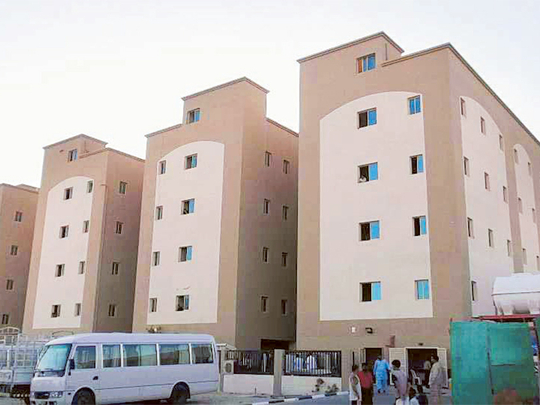
People do talk about growth and the other scenarios related to the property sector, but seldom focus on the staff accommodation market. This, particularly in Dubai, has recorded significant increase in demand as construction activity across the emirate soars.
In fact, the construction sector has been the main demand driver for labour accommodation. It is estimated that more than 14,000 buildings are currently under construction in Dubai. Investors have taken a note and developing more staff housing projects.
Today, the combined value of the top ten biggest projects in Dubai is estimated at $50.5 billion (Dh185.5 billion), the biggest of which is the $17.7 billion Lagoons being developed by Dubai Holding and Emaar Properties.
More than 65,000 units will be required over the next three years to accommodate the increasing population of labourers. Due to this, average rentals for staff accomodation have seen significant appreciation. A staff accomodation bed has also doubled from about Dh200 per person a month in 2009 to Dh450 in 2014. Dubai Investment Park has emerged as most popular location due to its proximity to mega construction projects.
Further growth in manpower intensive sectors such as hotel and retail has also led to a shortage in executive staff accommodation at affordable costs to the firms. Dubai currently has 90,000 hotel rooms and expects to add another 20,000 by 2016. By government estimates, nearly 20 per cent of the population is employed in retail and hospitality.
Housing accounts for at least 40 per cent of an employee’s total remuneration package. However, as housing costs have soared by up to 50 per cent in 2014, employees are looking at securing packages inclusive of accommodation rather than paying for it separately.
Continuous fluctuations in rents have forced most manpower intensive companies to look for long-term contracts or owning the properties rather than paying house rent allowances. Long-term contracts help companies to secure rents at a lower than market rate and improve predictability of cashflows.
Mobilisation is another key benefit of keeping staff around one place rather than different areas of the city. As a result, existing executive accommodation have been recording high occupancy.
Unlike other parts of the world, there are very few companies providing staff accommodation services. Therefore, many companies are investing in building staff housing. For instance, the facilities management company Imdaad earmarked Dh100 million to build a housing complex. It is also going to buy completed residential properties for middle- and senior-level management staff.
Emirates airline is developing five residential towers, which will be allocated to crew members, in addition to 570 villas for top-level management. Such activity is a clear indication of future demand.
Non-construction staff housing is usually better in quality and facilities. The unit mix typically consists of studio and one-bedroom apartments.
Buyers of staff accommodation typically include companies in hospitality, retail and facilities management. Most of such housing facilities are located in secondary areas such as Dubailand, Sports City and Dubai Silicon Oasis.
Other companies are looking at Sharjah and Ajman to relocate employees as increasing accommodation-related expenses are hurting low margin businesses. Amid tight supply, many companies might find it difficult to secure housing for staff.
This sector has traditionally been ignored by mainstream developers. However, as the market matures and demand for luxury property wanes, staff accommodation could be the answer to generate sustainable long-term leasing income.
Some developers have already made the foray. For instance, Dubai Properties has purpose-built units for staff accommodation. Many international companies have also been attracted by the potential and seeking to expand their operations in Dubai.
The writer is the Country Manager — UAE at Chestertons Mena.











